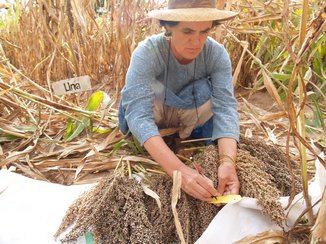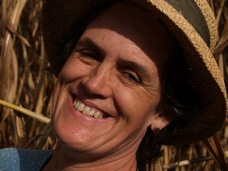“…I wanted to contribute in a similar way” – Eva Weltzien
Learning about the work of Nobel laureate, Norman Borlaug, in high school inspired Eva Weltzien to become a plant breeder so she too could contribute to improving the living conditions in the developing world. Today, Eva is a Principal Scientist in sorghum breeding and genetic resources at the International Crops Research Institute for the Semi-Arid Tropics (ICRISAT) in Mali.
“Not only did Norman Borlaug revolutionise agriculture by breeding high-yielding wheat varieties, he then selflessly distributed these to the countries in the world that most needed them, saving hundreds of millions from starvation,” Eva recollects passionately, as she speaks about her scientific hero. “I remember being inspired when he won his Nobel Prize in 1970, mainly for the fact that agricultural research was actually being seen as contributing to world peace,” says Eva. “I knew then that I wanted to contribute in a similar way.”
I…wanted to take a break from… theory and instead gain an appreciation for plant breeding by working in the field”
The path to plant breeding, and pearls along the way
Eva was raised in her native Germany, as well as in Beirut, Lebanon, where she spent six years when her parents were stationed at the local university there. She credits her parents; both plant pathologists, for instilling in her a scientific mind-set from a tender age.
“They taught me to think outside the box and apply my knowledge and understanding to how I made sense of the world,” Eva recalls. “Being plant pathologists, they also encouraged me to observe the environment carefully and treat the earth with respect.”
Upon graduating from high school, Eva deferred going to university and instead worked as a seed technician for a private company in Germany. “I just wanted to take a break from studying theory and instead gain an appreciation for plant breeding by working in the field,” says Eva.
After one year with the company, Eva was ready to start university. During the decade that followed, she completed a Diploma in Agricultural Biology (University of Hohenheim, 1981) and a PhD in Agriculture (Munich University, 1986).
A year after completing her PhD, Eva accepted a postdoc position at Iowa State University, USA, where she met her future husband Fred Rattunde. After a few years, both Eva and Fred moved to India to work with ICRISAT. “I’ve been working for ICRISAT for almost 27 years now,” says Eva. “When I first started, I was working in pearl millet breeding.”
The key challenges have been improving the infrastructure of the national research facilities… as well as increasing the technical training for local researchers…this has slowly improved, particularly in the last four years with the funding and help through the GCP Sorghum Research Initiative.…we can see our work making an impact on people’s lives…”
Off to Africa, and bearing fruit
In 1998, ICRISAT offered Eva and Fred positions in Mali where they would take responsibility for the Institute’s sorghum-breeding programme in West Africa.

Evaluating Eva: In Dioila district, Mali, evaluating the panicles of a new sorghum line after harvest.
“It was a great challenge that we both wanted to explore,” says Eva. “The key challenges have been improving the infrastructure of the national research facilities to do the research as well as increasing the technical training for local agronomists and researchers. Over the past 15 years, this has slowly improved, particularly in the last four years, with the funding and facilitation through the GCP Sorghum Research Initiative. Now we can see our work making an impact on people’s lives in West Africa.” (see GCP’s work on infrastructure improvement)
…we are closer to delivering more robust sorghum varieties which will help farmers and feed the ever-growing population in West Africa.”
Improving drought tolerance in sorghum for Africa
The second phase of GCP’s Sorghum Research Initiative focuses on Mali, where sorghum-growing areas are large, and distributed over a wide range of rainfall regimes.
Eva and her team are currently collaborating with local researchers at L’Institut d’économie rurale (IER), Mali and France’s Centre de coopération internationale en recherche agronomique pour le développement (CIRAD) on a project to test a novel molecular-breeding approach – backcross nested association mapping (BCNAM). Eva says the approach has the potential to halve the time it takes to develop local sorghum varieties with improved yield and adaptability to poor soil fertility conditions.
“We don’t have these type of molecular-breeding resources available in Mali, so it’s really exciting to be a part of this project.” Still, Eva and her colleagues continue to press forwards in this new frontier in plant science, making good advances in another parallel but closely related project that Eva leads in the GCP Comparative Genomics Research Initiative.
Eva continues, “We’ve had good results in terms of field trials, despite the political situation. Overall, we feel the experience is enhancing our capacity here in Mali, and that we are closer to delivering more robust sorghum varieties which will help farmers and feed the ever-growing population in West Africa.”
Slides (with more links after the slides)
Links
- The project Eva leads
- BLOGPOST: Comparative genomics in cereals (maize, rice and sorghum)
- Research Initiatives – Sorghum | Comparative genomics in cereals
- Sorghum research products
- More on Eva’s work in sorghum with other GCP colleagues







